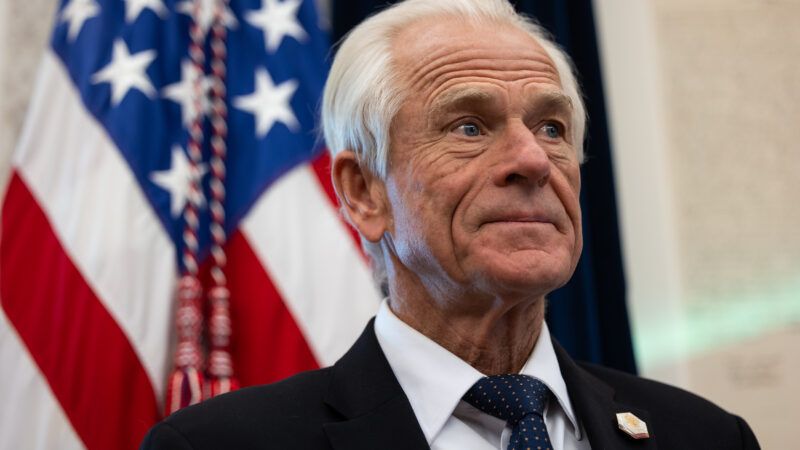Peter Navarro Says Tariffs Will Be a $6 Trillion Tax Increase, but Also a Tax Cut
If true, then these tariffs would be the biggest peacetime tax increase in American history.

In an interview with Fox News on Sunday, White House economic advisor Peter Navarro said the tariffs set to be announced this week would be one of the biggest tax increases in American history—while also promising the exact opposite.
"The message here is that tariffs are tax cuts," Navarro told Fox News' Shannon Bream in response to a question about President Donald Trump's apparent lack of concern over how tariffs could hike the price of cars.
But that's not the message that Navarro had delivered just moments earlier, when he touted the revenue-generating potential of the new tariffs, which Trump has threatened to impose later this week.
"Tariffs are going to raise about $600 billion a year, about $6 trillion over a 10-year period," Navarro said.
If that's true, then these tariffs would be the biggest peacetime tax increase in American history. A $600 billion annual tax increase would equate to about 2.2 percent of gross domestic product. Only the tax increases implemented to pay for World War II would compare.
Navarro's way of squaring that circle is to argue that those tax increases aren't tax increases at all—because the tariff revenue will be used to offset the budgetary cost of extending the 2017 tax cuts.
It is impossible to know whether that math works out because the White House has released few details about the tariffs that Trump has repeatedly promised to impose on April 2. Navarro provided no details in his Sunday interview with Fox News to explain how he arrived at the $6 trillion figure.
(Indeed, the lack of information regarding this week's tariff announcement is becoming its own story. In a separate interview also on Fox News, Kevin Hassett, director of the White House National Economic Council, said he "can't give…any forward-looking guidance on what's going to happen this week.")
Here's one way that Navarro could be arriving at that figure. Last year, the U.S. imported about $3 trillion in goods. A 20 percent tariff on all imports would therefore generate about $600 billion in annual revenue—but that assumes all those imports would still take place even with the new tariffs in place.
It's almost certain that overall imports would decrease if there were a 20 percent universal tariff. Indeed, much of the White House's messaging about tariffs assumes that imports would decrease and that the tariffs would bully businesses into doing more domestic manufacturing.
You can see that effect in analyses of Trump's tariffs on Canada, China, and Mexico. The Yale Budget Lab, for example, estimates that those tariffs will generate $1.5 trillion over 10 years, but that figure drops by about $300 billion when so-called "dynamic effects" are taken into account.
In short, the more efficiently tariffs reduce imports, the less useful they are as a revenue-generating tool. The opposite is also true: Tariffs can only generate a lot of revenue only if they fail at blocking imports. Trump and Navarro seem to be trying to have their cake and eat it too.
Navarro's economic illiteracy about tariffs and his apparent unwillingness to recognize that governmental policies have trade-offs is the sort of thing you might expect from a progressive Democrat or someone else on the far left of the political spectrum. And, indeed, that's basically what Navarro is—he was once called "San Diego's Bernie Sanders," as I detailed in a December 2020 feature for Reason.
Like with many of Sanders' ideas, buying Navarro's pitch on tariffs requires more than a bit of magical thinking.
"It insults the intelligence of the American people when he's saying the government is going to collect $700 billion a year" without any increase in their own costs, is how Sen. Mark Warner (D–Va.) responded to Navarro's comments during his own interview on Fox News. "That money doesn't come falling out of the sky."
Democratic senators opposing tax hikes. Sanders-style progressives setting economic policy in a Republican administration. Tax increases that are also tax cuts. Tariffs that can restrict imports while still raising revenue. The Trump administration's trade policy is getting more confusing by the minute.


Show Comments (26)